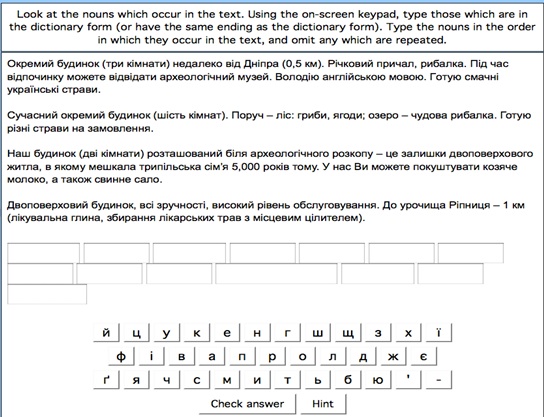
A Journey Through Online
Language Learning

Activities > Multiple Skills
Things to consider
Multiple-skills activities can combine any of the basic language skills of listening, speaking, reading and writing, as well as vocabulary and grammar practice. Most language tasks involve more than one skill and a tutor may want to develop multiple–skills activities to reflect real life scenarios. The activities can be practised online as part of comprehensive language courses, or specific-skills ones. They can be self-correcting or tutor-supported (which is usually more appropriate for higher-level courses).
For example, a writing task can be part of multiple-skills activities, such writing-and–speaking in the comprehensive course Hogelands. A student has a discussion with a peer via Skype prior to writing a summary of the discussion, or interviewing a fellow student for a research project before writing a report. In higher-level courses, such as Hogelands, writing often implies some reading or research, again making it a multi-skill (reading-writing-transferable academic skills).
Writing activities as part of writing-and-speaking or writing–and–listening are also found in Lagelands. They include completing a registration form after listening to an interview, writing a short piece about a fellow student’s hobbies after interviewing this student, or plans for a weekend following a chat which is conducted via web call or in a classroom.
Developing these types of writing activities in a fully online context requires little technical know-how on the part of either the developer or the student. Assignments tend to be posted online through a VLE or on the course’s website. Students can email or post their texts to the tutor for feedback, which can be provided face-to-face (in a class-room or during a web-call) and/or in writing.
Specific-skills courses can focus on more than one basic language skill, as in the case of Developing Listening and Speaking Skills in Polish where equal emphasis is put on listening and speaking activities. Students listen to dialogues and practise speaking by role-playing, checking their answers against pre-recorded models.

- What type of course do you want to offer? Will the activities be part of a comprehensive language course, or will they be offered as a specific-skills course?
- What activities do you want the students to practise?
- Will the activities be part of a blended learning context or wholly online? This will impact on the format of feedback.
- Will the exercises be self-correcting or tutor-supported? If self-correcting, ensure the feedback is adequate (e.g. “model” answers are provided). If tutor-supported, how much support can you/are willing to offer as a tutor?
- Will the activities be assessed? How do you want to assess them?
- Do you have adequate technical know-how to develop the activities? If not, will you have the right level of technical support?
Examples:
- Developing Listening and Speaking Skills in Polish
- Hogelands
- Lagelands
- Read Ukrainian
Example of reading-vocabulary – grammar practice exercise in Read Ukrainian. Students practise declination of nouns by writing the correct case in Ukrainian using an on-screen Ukrainian keypad.
The materials in Read Ukrainian are concerned primarily with reading skills, but there are some exercises involving vocabulary-grammar practice designed to consolidate vocabulary and sentence structure, in addition to writing using the Cyrillic alphabet.
Disclaimer I Freedom of Information I Accessibility I Contact Us
University College London, Gower Street, London, WC1E 6BT Tel: +44 (0) 20 7679 2000
© UCL 1999–2011